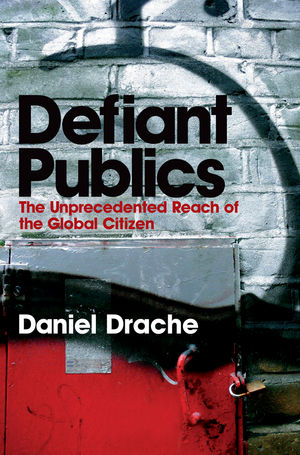York University political economist Daniel Drache is a prolific writer and editor. It sometimes seems that he writes faster, the ideas gushing out, than the rest of us can read.
His latest book, Defiant Publics: The Unprecedented Reach of the Global Citizen, published by the prestigious Polity Press in 2008, may be his best yet. It is a thought provoking book about globalism to come from someone who was a leading nationalist writer, and activist, in the 1960s. It is prescient in describing global protest that, as a result of the global financial crisis, has sharply increased since he wrote this book. It is a work of impressive erudition that attempts to order and make sense of a vast literature.
The central theme of the book draws on the Canadian school of communications associated with Harold Innis and Marshall McLuhan. The printing press led to nationalism — national identity, national consciousness, national citizenship. The new communications technologies of the contemporary information revolution are permitting new forms of transnational communication that are creating global consciousness and global citizenship.
The national elites that morphed into Davos Man are losing legitimacy and new publics are emerging, separately and together, that are defiant and demanding.
I’m an Innis and McLuhan fan myself and think that what is happening around us at the moment, with text messaging and blogging and googling and twittering and everything else that is possible in this wireless and wired world, just may be the biggest thing since the Gutenberg press, information technology, including computer modeling of investing and hedging and speculating, led to the financial frenzy that then imploded, creating chaos and, in its turn, protest. Information techology, via the Internet, enabled Barack Obama to raise the money and rally the volunteers that, in the context of the economic crisis, got him elected.
All of which happened since Drache wrote. It’s compelling confirmation of the importance of the new media.
How this will all play out nobody knows. Protest against summits and the WTO were one of the new wonders of the world, and then came 9/11 and the pause at the heart of empire, Canada included, that has yet to lift.
To his great credit as a long-time political activist, Drache is an optimist. He recognizes, however, that crises — great transformations — can be violent and re-arm the authoritarian right. As I write, the American right rants and raves against Obama’s attempts to mitigate the economic crisis. It may be the dying gasp of neo-conservatism but just to be sure, we’d best hope that what Obama is doing works.
Today, as the downside of that very plethora of information that technology creates, we are surrounded by pundits who know all of the answers and none of the questions. Drache, like all of us, is tempted to write sometimes as if he knows the answers.
Where he’s good is on the questions. What’s happening to public space and public discourse and who is going to thrive in it? And he knows the names to drop, like Habermas and Foucault and Arendt, as he searches for answers.
Here’s the last sentence in his book: “The times are indeed strange; be ready for anything. Don’t try to make things up.”
So read him and ponder his words and act personally and collectively.–Mel Watkins
Mel Watkins is Professor Emeritus of Economics and Political Science at University College, University of Toronto and visiting Professor of Canadian Studies at Simon Fraser University.




